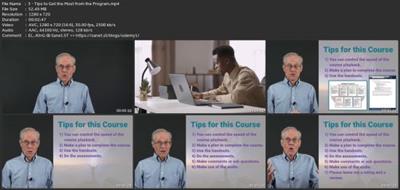Published 12/2022
MP4 | Video: h264, 1280x720 | Audio: AAC, 44.1 KHz
Language: English | Size: 1.49 GB | Duration: 1h 15m
Apply Systems Thinking and Strategic Thinking Skills to Assess and Improve Your Organization's Performance
What you'll learn
Get a big picture view of your organization using the "Transformation Model"
Learn to speak more articulately about what it happening inside your organization
Assess your current business situation-demands, opportunities and threats
Evaluate your company or organization's current business strategy and core ideology
Determine the fit between your organizations philosophy (guiding principles) and attitudes and habits of employees
Understand your core processes and assess the strength of your core and support processes
Assess the impact of your organizational structure on business results
Understand how your coordinating and development systems currently contribute to your culture and results
Diagnose the attitudes and work habits of members of your organization
Create initiatives to improve the performance of your organization
Get out of the weeds so you can solve problems more effectively
Take a big picture view of your organization so you can think like a CEO
Requirements
There are no prerequisites to taking this course, just an open mind and willingness to understand how organizations work
Description
Welcome to "Thinking Like a CEO." The course will enable you to use whole system thinking and strategic thinking to make you a smarter and more informed leader or member of your organization.I organize this program around the Transformation Model (which you'll see in my preview video and then use as you go through the course). The model reduces the complexity of an organization to the seven key variables that need to be understood and aligned in order for your organization (large or small) to achieve peak success. The model will help you step back from the day-to-day operation and look at your business or organization from a wholistic and systems point of view. Seeing the big picture is learning to think like a CEO. Most people, on learning the model, have a much better grasp and understanding on what goes on in their organization. You'll see your company, business, or organization in a more enlightened way as you also learn . The model is based on two premises:1. All organizations are perfectly designed to get the results they get.The results you're getting in your organization are not haphazard. They're a function of how you've designed your organization and by design I'm talking about a lot more than structure or reporting relationships. Design has to do with understanding and aligning each of the seven elements of the Transformation Model. 2. The most important work of leaders is "on" systems and not "in" systems.Working in a system is being caught up in the sequential events or most urgent problems of the day. Although the day-to-day flow of work is important, this isn't where you add the most value as a leader. You add the most value when you're working "on" systems which means that you see the interdependencies suggested by the Transformation Model and are able to diagnose and resolve problems or improve performance by maintaining this high-level view of things. You'll see what's going on in your organization in a more enlightened way.You'll use the skill of systems thinking to understand the model and how the various elements of the model impact your results. You'll make a tremendous contribution by speaking from the framework of the model as well as identifying opportunities for making improvements to your organization. Take-Aways from the Course:By going through the course, you'll:Apply systems thinking and strategic thinking skills to your organizationLearn to think like a CEOStep back and gain a wholistic view of your organizationDo an assessment of each of the seven elements of the Transformation ModelBecome more more enlightened about how your organization actually worksDeepen your understanding of your leadership role (whether as a formal or informal leader)Spend more time in value-added activities (and reduce fire-fighting)Build a stronger and more effective team or organization. Develop concrete ideas for improving your organization Organization of the CourseThis is not a long course. I avoid theory and fluff and jump right into the content. I've organized the course into three sections:Section One: Introduction in which I frame the course and offer you tips for getting the most value out of it. Notice that I'm giving you a number of tools and resources, up front, to help you understand the content.Section Two: You'll do a comprehensive and high-level assessment of your organization. This is roll-up your sleeves time. I'm not just teaching you about the model but want you to apply it to your organization. This is how you'll get the content from theory to practice.Section Three: You'll take a step back and take a look at the key learnings from the application of the model to your organization. I'll take you through a process to identify strengths, weaknesses, areas of alignment and misalignment as well as key leverage points or the greatest opportunities to make improvement to your business.My bio:Just a little about me. I have a dual background in psychology and organizational behavior. I've co-founded two companies-the Human Development Institute and Center for Organizational Design and have spent 25 years doing consulting and training to all types and sizes of organizations to create high performing organizations through leadership and team development. One of these programs is the Transformation Model which I've used with thousands of people in dozens of organizations to not only assess but make incredible improvements to their organizations. And since 2000, a business partner and I have certified over 1500 trainers and consultants from around the world to use our programs, including the Transformation Model.
Overview
Section 1: Introduction
Lecture 1 Introduction
Lecture 2 All Organizations are Perfectly Designed to Get the Results They Get
Lecture 3 Tips to Get the Most from the Program
Section 2: Assessment Using the Transformation Model
Lecture 4 Introduction to Assessment
Lecture 5 Assessment of Your External Environment
Lecture 6 Assessment of Your Strategy
Lecture 7 Assessment of Your Core Process
Lecture 8 Assessment of Your Structure
Lecture 9 Assessment of Systems
Lecture 10 Assessment of Culture
Lecture 11 Assessment of Results
Section 3: Stepping Back and Looking at the Whole
Lecture 12 Cause-Effect Nature of the Model
Lecture 13 Summary Assessment
Lecture 14 Implications for My Leadership
Lecture 15 Managing an Initiative
Lecture 16 Conclusion and Next Steps
Anyone who cares about the health and well-being of their organization,Formal and informal leaders,Senior leaders,Managers and supervisors,Any employee who wants to have a better grasp on how organizations work
Download link
rapidgator.net:
uploadgig.com:Kod:https://rapidgator.net/file/9958cd5150949a64dc474947af89b534/pobvq.Whole.Systems.ThinkingThinking.Like.A.Ceo.part1.rar.html https://rapidgator.net/file/c9e68c69a4fe042494d1839a59cfb75c/pobvq.Whole.Systems.ThinkingThinking.Like.A.Ceo.part2.rar.html
nitroflare.com:Kod:https://uploadgig.com/file/download/fd96832b10766a3F/pobvq.Whole.Systems.ThinkingThinking.Like.A.Ceo.part1.rar https://uploadgig.com/file/download/07bd5cb2cfa513e3/pobvq.Whole.Systems.ThinkingThinking.Like.A.Ceo.part2.rar
1dl.net:Kod:https://nitroflare.com/view/30CF59547DB3525/pobvq.Whole.Systems.ThinkingThinking.Like.A.Ceo.part1.rar https://nitroflare.com/view/7E673D203432E8A/pobvq.Whole.Systems.ThinkingThinking.Like.A.Ceo.part2.rar
Kod:https://1dl.net/v2xw7jbga00t/pobvq.Whole.Systems.ThinkingThinking.Like.A.Ceo.part1.rar.html https://1dl.net/04cza0p64dzg/pobvq.Whole.Systems.ThinkingThinking.Like.A.Ceo.part2.rar.html
2 sonuçtan 1 ile 2 arası
-
03.12.2022 #1Üye



- Üyelik tarihi
- 20.08.2016
- Mesajlar
- 144.947
- Konular
- 0
- Bölümü
- Bilgisayar
- Cinsiyet
- Kadın
- Tecrübe Puanı
- 153
Whole Systems Thinking--Thinking Like A Ceo
-
03.12.2022 #2Üye



- Üyelik tarihi
- 16.03.2022
- Yaş
- 41
- Mesajlar
- 20.458
- Konular
- 0
- Bölümü
- Gemi inşaatı ve gemi makineleri
- Cinsiyet
- Erkek
- Tecrübe Puanı
- 23
Cevap: Whole Systems Thinking--Thinking Like A Ceo
[Misafirler Kayıt Olmadan Link Göremezler Lütfen Kayıt İçin Tıklayın ! ] Cho mình má»t vé
[Misafirler Kayıt Olmadan Link Göremezler Lütfen Kayıt İçin Tıklayın ! ]
Konu Bilgileri
Users Browsing this Thread
Şu an 1 kullanıcı var. (0 üye ve 1 konuk)



 LinkBack URL
LinkBack URL About LinkBacks
About LinkBacks






 Alıntı
Alıntı
Konuyu Favori Sayfanıza Ekleyin